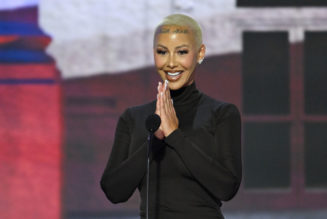This is an edition of The Atlantic Daily, a newsletter that guides you through the biggest stories of the day, helps you discover new ideas, and recommends the best in culture. Sign up for it here.
The Latest
Today, the Supreme Court ruled that the race-conscious admissions programs as practiced at the University of North Carolina at Chapel Hill and Harvard are unconstitutional, upending more than four decades of precedent on the use of race in college admissions.
Spend time with our writers’ analysis of the decision:
- “Race neutral” is the new “separate but equal,” Uma Mazyck Jayakumar and Ibram X. Kendi argue.
- The decision takes a tool meant to prevent discrimination against Black Americans and turns it on its head, Adam Harris explains.
- Curtailing affirmative action is a blow against a rising generation, Ronald Brownstein argues.
The price of attending blockbuster concerts is astronomical, but Americans are still buying tickets. Why, in our weird economic moment, is live music a priority?
First, here are three more new stories from The Atlantic:
Fleeting and Scarce
For the past few months, my Instagram feed has been peppered with posts of people going to see the Taylor Swift Eras tour in various cities around the country. Friends and their friends, bedecked in cowboy boots, glitter, and beaded bracelets, are sharing giddy stories from stadium parking lots and nosebleed seats. I’m happy for them—it looks like fun!—and, frankly, I’m also wondering how they all scored tickets.
Tickets to the show were difficult to get on Ticketmaster, to put it mildly. So chaotic was the presale in November that Swift herself likened the process to “bear attacks.” It prompted a Senate Judiciary subcommittee to initiate a hearing on lack of competition in the concert-ticket industry. Resold tickets went for many hundreds, or even thousands, of dollars.
I have become curious in recent months about why, in a period of high inflation and financial strain for many Americans, some people are so willing to shell out for concert tickets. It’s not just Taylor—Beyoncé and Bruce Springsteen are also among the superstars who are selling out stadiums while charging hundreds or thousands of dollars for passes to their blockbuster shows.
The obvious reason is that these artists are great, and many fans who can (even loosely) afford to see them want to. Unemployment is low, and some fans have discretionary income they are open to spending. People have deepened their relationship with musicians during the coronavirus pandemic, my colleague Spencer Kornhaber told me. He said that the huge appetite for concerts we are seeing now may be a “lagging indicator of that demand for experience.”
Concert tickets are not the stalwart inflation indicator that gas fluctuations or egg prices are, but how people approach them tells us a lot about the ways Americans are spending their money. Rapidly rising prices for services—including items such as concert tickets—are now responsible for a bigger portion of overall inflation than they have been in years past. As grocery inflation moderates and gas prices go down, the prices of services remain stubbornly high. (That category includes a range of nonphysical items that rely on labor, including hospital care and school tuition as well as event tickets.) Even as the Fed cranks up interest rates to try to curb consumer spending, these categories seem to be resistant. “We’re not seeing that slowdown in [the cost of] services we expected,” Jason Mercer, a live-entertainment analyst at Moody’s Investors Service, told me. One possible reason that prices are high, he added, is that concert organizers and artists are “taking advantage” of pent-up demand from consumers after years without live events.
How people are spending their money is a good indicator of how they are feeling. If someone is signing a long-term lease or buying a house, that suggests they feel optimistic about the future (at least optimistic enough that they are willing to enter a long-term financial engagement, which they expect they will have enough money to continue). But if someone is buying a concert ticket, that tells us more about how they are feeling right then, in that moment, as the New York Times reporter Jeanna Smialek explained on a recent episode of the Times podcast The Daily. Tickets are a onetime purchase—though they can be a major one, and are becoming pricier.
The average resale price for concert tickets went from $116 over a three-month period in mid-2019 to $240 over the same period this year, according to data SeatGeek shared with me. And the inflation rate for “live performing admission events” is currently 2.6 percent higher than overall inflation in the U.S., Reuters reported. (In a paper on “rockonomics,” Princeton researchers found that from the late 1980s through early 2000s, concert-ticket prices outpaced inflation.)
A number of factors are causing ticket prices to spike. Even before the pandemic, the costs of running a large show—factoring in artists, vendors, venues, promoters, and others—were high. Now new variables, such as supply-chain disruptions and COVID-related delays, have made it even pricier. Mercer, the Moody’s analyst, told me that artists, who help set the initial price for concert tickets, may also be influenced by seeing others raise prices: “It’s almost as though one artist sets a new bar and then the next artist can take it from there.”
Many people are also blaming Ticketmaster, whose parent company, Live Nation, controls a significant share of the live-music-ticketing market, for exorbitant prices and fees. In January, the Senate Judiciary Committee held a hearing about the effects of the company’s dominance. (The musician Clyde Lawrence began his testimony, “Good morning, senators, and thank you for inviting us today to the most unique gig we’ve had in years.”) Some artists have tried to resist Ticketmaster. Robert Smith of The Cure successfully pressured the company to refund some fees this spring, and Maggie Rogers announced that she would sell some tickets for her Summer of ’23 Tour in person. (Asked for comment about ticket prices and their fee calculation, Ticketmaster passed along links to blog posts and other publicly available information. Their testimony in the January Senate hearing can be read here.)
Although major concerts are now massively expensive, smaller artists are finding touring so unsustainable that they are canceling their shows. That the economics of live music are not panning out for them suggests something surprising: Live music “might be undervalued, really,” Spencer told me.
Concerts are not the main driver of inflation, of course, but economists are still paying attention to the events’ impact on the wider economy. As I wrote in this newsletter a couple of weeks ago, economists in Sweden worried that Beyoncé’s Renaissance tour had led to a surge in local prices. Last week, the chief economist of UBS Global Wealth Management published a note titled “A Beyoncé Price Bounce?” exploring whether her tour had led to a similar phenomenon in the United Kingdom. “For UK inflation, the pressures may persist,” he concluded.
In this odd economic moment, many people are finding that concerts and other experiences are how they want to spend their money. Seeing Taylor sing for more than three hours, or reaching transcendence in Beyoncé’s mosh pit, may just be worth it to some. “Having one special night with one particular, highly coveted artist in one space—you can never have it again,” Spencer told me. “Live music is one of the most fleeting and scarce commodities that you can imagine.”
Related:
Today’s News
- Violent protests over the fatal police shooting of a 17-year-old in France continued for a second night. Almost 200 people were arrested yesterday evening.
- The U.S. economy grew 2 percent in the first quarter of the year, which was higher than previous estimates.
- “Presumed human remains” were recovered from the wreckage of the Titan submersible.
Evening Read

Scientists Found Ripples in Space and Time. And You Have to Buy Groceries.
By Adam Frank
The whole universe is humming. Actually, the whole universe is Mongolian throat singing. Every star, every planet, every continent, every building, every person is vibrating along to the slow cosmic beat.
That’s the takeaway from yesterday’s remarkable announcement that scientists have detected a “cosmic background” of ripples in the structure of space and time. If the result bears up as more data are gathered, it’s a discovery that promises to open new windows on everything from the evolution of galaxies to the origin of the universe.
More From The Atlantic
Culture Break

Listen. In a new episode of Radio Atlantic, staff writers Anne Applebaum and Tom Nichols discuss the week’s events in Russia—and the power of a failed revolt.
Watch. The Turner Classic Movies channel, with its ad-free screenings of old films, is a genuine pleasure. It’s also facing deep staffing cuts.
P.S.
Though I would not consider myself a Swiftie, I enjoy many of Taylor Swift’s songs and appreciate that she’s an excellent businesswoman. One of my favorite Taylor nuggets: When FTX approached her about a sponsorship deal, she apparently asked, “Can you tell me that these are not unregistered securities?” This question proved prescient, as it is now a question the SEC is asking!
She dodged a decentralized bullet. A host of other celebrity spokespeople were named in a class-action suit right after FTX collapsed, and various others, including Lindsay Lohan, Akon, and Jake Paul, have since faced SEC charges for promoting crypto assets without proper disclosures. Last month, Shaquille O’Neal was served papers at an NBA playoff game in the Miami venue formerly known as FTX Arena.
— Lora
Katherine Hu contributed to this newsletter.









